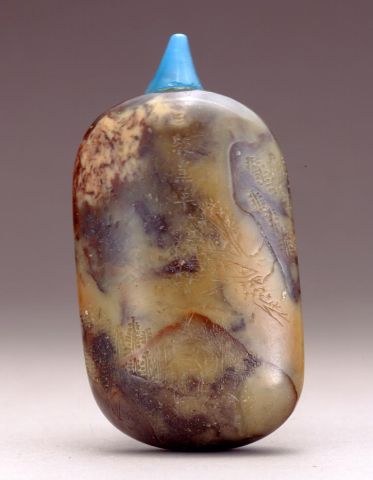
Bottle ID: 241
PEBBLE, INCISED LANDSCAPE
Date: 1750-1850
Height: 67 mm
Soapstone, very well hollowed, of irregular oval pebble form, of gray, brown, russet and yellow tones, lightly incised on one side with a pavilion nestled in a mountainous landscape, a large rock to one side from which hangs a gnarled tree, a three character signature, Jiang chun shui beside two seals Zhou and Shan and a poem reading:
Beneath the pines, I asked his house-boy,
Who said, "Master has gone to gather herbs
Just somewhere in these mountains,
Among clouds so deep, I know not where".
The reverse signed Zishan and incised with a poetic inscription reading:
Yue sha gaoyang, "They say, "Let's kill lambs and sheep".
Similar Examples:
Crane no. 277
Provenance:
Clare Lawrence Ltd.
Sotheby's, Hong Kong, November 3, 1994, lot 909
The Kaynes-Klitz Collection
Published:
Moss, Hugh M. Snuff Bottles of China, 1971, pp. 88-89, no. 107
Hugh M. Moss. An Exhibition of Chinese Snuff Bottles, London, June 1970, p. 39, no. 142
The first verse quoted is taken from a poem entitled "Seeking a Recluse and not Finding Him" by Jia Dao (779 - 843) and is published in The Complete Poems of the Tang (Quantangshi). This collection of poems is the major source of surviving Tang Dynasty poems, and is one of the largest and most important collections of Chinese poetry. The Quantangshi was compiled in 1705 during the reign of Kangxi, although the poems themselves date from 618 - 907. Jia Dao, whose artname was Langxian was born near Beijing, although after living as a Buddhist monk, he went to Chang'an. He failed the Official Examinations several times and even though he became a poet, his works were criticized by his contemporaries as superficial, limited and artificial.
The reverse where a simple sentence is incised is the third line of a stanza taken from the Classic of Poetry (Shijing), of which the complete stanza reads:
"Tenth month, threshing ground now swept clean,
With convivial wine now to enjoy,
They say, "Let's kill lambs and sheep
Go up to our lord's hall,
And there raise the rhinoceros horn cup
To wish him a myriad year's without end."
The Classic of Poetry is also known as the Book of Songs (or Odes), and is the earliest existing collection of Chinese poems and songs, comprising of 305 stanzas. It first became know as a "canon" after the Han Dynasty officially adopted Confucianism around the first century AD.

 English
English 中文
中文